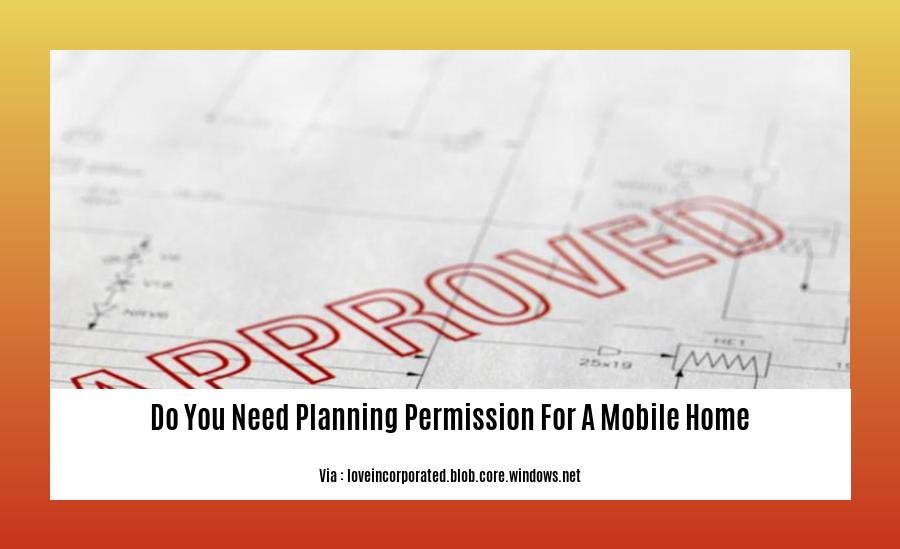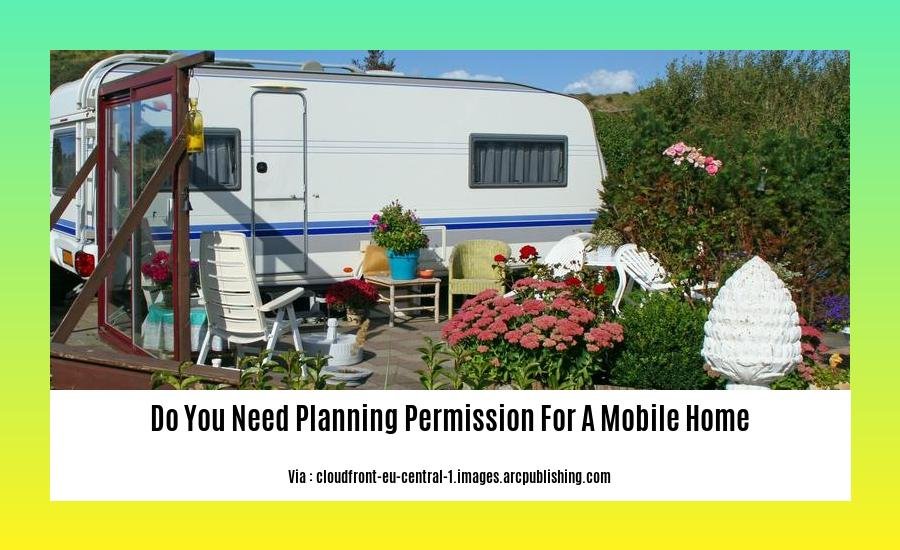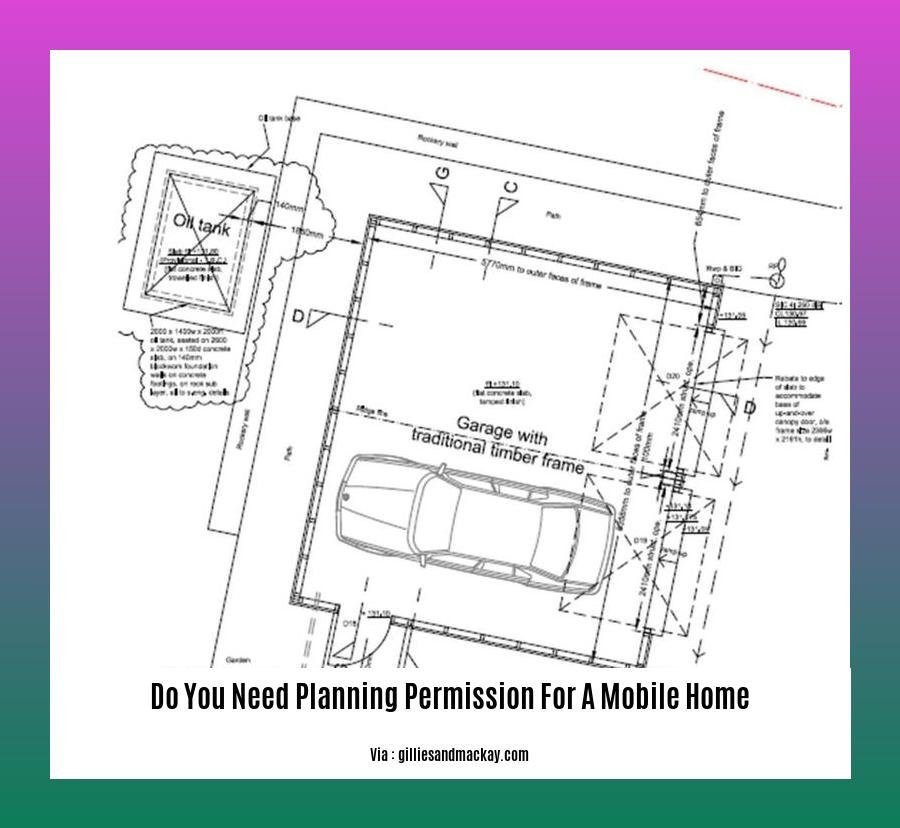[- Do You Need Planning Permission for a Mobile Home: Navigating the Legal Landscape]: Mobile homes have become increasingly popular due to their affordability and convenience. However, the legality of installing a mobile home can be a complex issue depending on the location and the local regulations. Whether you’re a homeowner considering a mobile home addition or a park operator managing multiple units, understanding the planning permission requirements is crucial. This article delves into the intricacies of mobile home regulations, providing clarity on when and how to obtain the necessary approvals.
Key Takeaways:
- Planning permission for a mobile home hinges on its intended purpose.
- For secondary dwellings or non-residential purposes, permission may be unnecessary.
- Permission is generally required for primary residences.
- While mobile homes are inherently movable and don’t alter the land, planning permission is still needed in certain cases.
- In Ireland, planning permission is essential for permanent residency in a mobile home.
- In Ireland, placing a mobile home on your land without planning permission is prohibited.
Do You Need Planning Permission for a Mobile Home?

Are you exploring the exhilarating prospect of embracing the nomadic lifestyle in a mobile home? Or perhaps you’re seeking a compact yet cozy permanent dwelling? Either way, understanding the intricacies of planning permission for mobile homes is crucial. Join me as we delve into the legal landscape, unraveling the essence of this requirement.
Do I Need Planning Permission for a Mobile Home? The Crucial Distinction
The answer to this pivotal question hinges upon the intended purpose of your mobile home:
-
Secondary Dwelling or Non-residential Use: In such cases, the winds of planning approval may be in your favor, as permission is often not required. Whether it’s a guest house, a home office, or a yoga studio, embarking on your project sans planning permission may be feasible. However, a quick chat with your local planning authority is always a prudent move to confirm this.
-
Primary Residence: If your mobile home is destined to be your primary abode, housing your dreams and aspirations, then securing planning permission is likely a legal necessity. Ensuring compliance with local regulations and zoning restrictions is paramount to avoid any potential legal complications.
Planning Permission for Mobile Homes: A Deeper Dive
Understanding the ins and outs of planning permission for mobile homes is like navigating a labyrinth, requiring a keen eye and a steady resolve. While the specific regulations and procedures may vary across regions, some common threads can guide our exploration:
-
Permitted Developments: In certain scenarios, the gods of planning may smile upon you, exempting your mobile home project from the planning permission requirement. Temporary use, seasonal occupation, specific mobile home parks, and certain types of permitted development rights may fall under this umbrella. Embark on a quest to discover if your project qualifies for such exemptions.
-
Planning Permission Application: Should you find yourself in a realm where planning permission is mandatory, brace yourself for a voyage into the world of applications. Prepare to submit a meticulous dossier, including detailed plans, site surveys, and a persuasive statement outlining your case. Be prepared to engage in dialogue with the planning authority, addressing any queries or concerns they may raise.
-
Considerations for Mobile Home Owners: As you embark on your mobile home journey, a few wise considerations can pave the way for a smooth and harmonious process:
-
Location, Location, Location: The age-old mantra of real estate applies here too. Diligent research and due diligence are key to selecting a suitable site for your mobile home, ensuring compliance with relevant regulations and minimizing the risk of objections.
-
Environmental Impact: Tread lightly on the earth, my friend. Consider the potential environmental impact of your mobile home and take proactive steps to minimize it. Embrace sustainable living practices, energy-efficient design, and eco-friendly materials to create a harmonious coexistence with nature.
Conclusion: A Path Forward
The realm of planning permission for mobile homes is an ever-evolving landscape, shaped by a multitude of factors. Embark on a journey of exploration, seeking guidance from local authorities, urban planning experts, and fellow mobile home enthusiasts. Approach the process with patience, perseverance, and a willingness to navigate the twists and turns of the regulatory maze. Remember, the ultimate goal is to create a dwelling that aligns with your dreams and aspirations, while respecting the legal framework that governs our built environment.
-
Wondering if your mobile home might lose value over time? Learn more about do mobile homes depreciate in value in this comprehensive guide.
-
Considering a modular home but worried about its value over time? Explore our insights on do modular homes depreciate in this detailed guide.
-
Need immediate medical attention at home? Find the convenience you need with doctor at home near me services. Click for fast access to healthcare at your doorstep.
-
Planning a bathroom remodel and curious about its impact on your property’s worth? Discover the facts: does bathroom remodel increase home value in our detailed guide.
-
Thinking of remodeling your bathroom but unsure about its value-adding potential? Find out if does remodeling a bathroom increase home value in this thorough guide.
Planning Permission Process: Outlining the steps involved in obtaining planning permission, including application submission, documentation provision, and addressing objections.

Hello there, readers! Let’s dive into the world of planning permission for mobile homes. Many countries and regions have specific rules and regulations regarding the installation and placement of mobile homes. To avoid legal pitfalls and ensure a smooth process, it’s essential to understand these legal requirements.
Navigating the Planning Permission Maze
So, what’s this planning permission process all about? It’s a set of steps you’ll need to follow to get the green light for your mobile home project. Let’s break it down:
- Getting to Know the Local Rules:
-
Before you do anything, check with your local planning authority. Knowing their specific regulations for mobile homes will save you time and headaches later on.
-
Permitted Developments:
-
In some cases, you might be lucky enough to avoid the planning permission process altogether. There are exceptions for temporary use, seasonal occupation, and specific mobile home parks. Check to see if you fall into one of these categories.
-
Outline Planning Permission:
-
If you need full-blown planning permission, you’ll start with an outline application. This is basically a rough sketch of your plans, including the size, location, and design of your mobile home.
-
Detailed Planning Permission:
-
Once your outline application is approved, you’ll need to provide more detailed plans and information, such as construction materials and landscaping designs.
-
Addressing Objections:
- Sometimes, neighbors or other parties may have concerns about your mobile home plans. Be ready to address these objections and provide any necessary changes to your project.
Key Takeaways:
- Always check with your local planning authority to understand the specific regulations for mobile homes in your area.
- Know when planning permission is not required, such as for temporary use or in specific mobile home parks.
- The planning permission process involves getting outline permission, submitting detailed plans, and addressing any objections that may arise.
- Consider seeking professional advice from planners or architects to help you navigate the process smoothly.
- Be patient and persistent throughout the planning permission process, as it can sometimes take time to obtain approval.
Citations:
LexisNexis: Outline Planning Permission
Addland: Outline or Full Planning Permission
Considerations for Mobile Home Owners: Providing practical advice on choosing appropriate locations, conducting due diligence, and ensuring compliance with regulations.
If you’re making your mobile home dreams a reality, navigating the legal landscape is key to ensuring a smooth journey. Laws and regulations vary from place to place, so let’s dive into the crucial steps that’ll keep you on the right side of the law.
Key Considerations:
- Choosing the Right Location:
-
Zoning laws dictate where you can park your mobile home. Do your research, check with local authorities, and select a spot that aligns with the rules.
-
Conducting Due Diligence:
- Before you sign on the dotted line, inspect the property thoroughly. Look for potential issues like drainage, access, and proximity to utilities.
Ensuring Compliance with Regulations:
- Planning Permission:
-
Some areas require planning permission for mobile homes. File an application with detailed plans and address any objections promptly.
-
Permitted Developments:
-
In certain cases, you may not need planning permission. Check with your local authority to confirm if your project falls under permitted developments.
-
Environmental Impact:
-
Minimize your environmental footprint. Proper waste disposal, energy-efficient living, and eco-friendly practices are key.
-
Safety Inspections:
- Ensure your mobile home meets safety standards. Regular inspections by qualified professionals are essential for peace of mind.
Embracing the Mobile Home Lifestyle:
- Community Living:
-
Mobile home parks offer a sense of community and shared experiences. Embrace the social aspect and make lasting connections.
-
Financial Considerations:
-
Mobile homes can be more affordable than traditional housing options. Consider costs like maintenance, insurance, and taxes.
-
Legal Protection:
- Familiarize yourself with your rights and responsibilities as a mobile home owner. Knowledge is power, especially when it comes to legal matters.
Maintaining Your Mobile Home:
- Regular Maintenance:
-
Keep your mobile home in tip-top shape with regular maintenance. This includes checking appliances, plumbing, and electrical systems.
-
Curb Appeal:
-
Make your mobile home a place you’re proud of. Invest in landscaping, paint, and other aesthetic touches.
-
Sustainable Living:
- Embrace sustainable living practices. Conserve energy, reduce waste, and enjoy a greener lifestyle.
By following these guidelines, you’ll navigate the legal maze of mobile home ownership with confidence. Remember, staying informed, being proactive, and respecting the rules will ensure a smooth and hassle-free journey.
Key Takeaways:
- Research Zoning Laws:
- Understand zoning regulations to select a compliant location for your mobile home.
- Inspect Properties Thoroughly:
- Conduct inspections to identify potential issues before committing to a purchase.
- Apply for Planning Permission:
- If required, file a detailed planning permission application and address any objections.
- Comply with Environmental Regulations:
- Adopt eco-friendly practices and ensure your mobile home meets environmental standards.
- Embrace Community Living:
- Engage with your mobile home community and enjoy the social benefits it offers.
- Consider Financial Implications:
- Factor in maintenance, insurance, and taxes when budgeting for your mobile home.
- Maintain Your Mobile Home:
- Regular maintenance, curb appeal, and sustainable living practices keep your mobile home in top condition.
- Stay Informed and Proactive:
- Stay updated on legal requirements and be proactive in resolving any issues.
Sources:
Buying a Mobile Home: Buyer Regret, Hidden Costs, Pros & Cons
50 Incredibly Useful Tips About Mobile Homes • MHL
Alternative Options: Exploring Housing Alternatives That May Not Require Planning Permission
Imagine a world where homeownership and mobility go hand in hand. No longer restricted by the constraints of traditional housing, you can find freedom and flexibility in alternative housing solutions that may not require planning permission. Welcome to the realm of park homes, tiny homes, and movable dwellings, where affordability, sustainability, and a sense of community await.
Tiny Homes: A Compact Oasis of Affordability
Picture a cozy, space-efficient dwelling that fits your minimalist lifestyle and budget. Tiny homes are a growing trend in sustainable living, offering a compact yet comfortable abode. These portable homes unlock a world of possibilities for adventure-seekers, allowing you to explore different locations without the burden of a permanent mortgage.
Park Homes: A Sense of Community
Nestled amidst beautifully landscaped surroundings, park homes offer a harmonious blend of privacy and community. These residential units come with their own plot of land and provide access to shared amenities such as playgrounds, pools, and community events. Whether you’re a retiree seeking a tranquil retreat or a family looking for an affordable place to settle, park homes offer a unique living experience.
Movable Dwellings: Embracing a Nomadic Lifestyle
If wanderlust courses through your veins, movable dwellings may be your ideal haven. From caravans and campervans to yurts and treehouses, these dwellings embody the essence of freedom and mobility. Embark on cross-country journeys, discover hidden gems, and leave behind the constraints of a stationary home.
Key Takeaways:
-
Tiny Homes: Compact, mobile, and affordable dwellings that prioritize sustainability and minimalism.
-
Park Homes: Residential units in landscaped communities with shared amenities, providing affordability and a sense of community.
-
Movable Dwellings: Embodies freedom and mobility, allowing individuals to explore new locations and embrace a nomadic lifestyle.
Relevant URL Sources:
[1] Tiny House Communities You Can Live In
[2] 7 Affordable Alternative Housing Solutions
FAQ
Q1: Do I need planning permission for a mobile home in Ireland?
A1: Yes, in Ireland, planning permission is generally required to place a mobile home on your land, whether it’s for primary residence or secondary dwelling purposes. Failing to obtain planning permission can result in enforcement action by local authorities.
Q2: What are the factors that determine whether I need planning permission for a mobile home?
A2: Planning permission for a mobile home largely depends on its intended use. If the mobile home is intended for primary residence, planning permission is likely necessary. However, if it’s for non-residential purposes such as a holiday home or office, permission may not be required. Additionally, the specific regulations and requirements can vary depending on the local authority’s policies and zoning laws.
Q3: What is the process for applying for planning permission for a mobile home?
A3: The process for applying for planning permission for a mobile home typically involves submitting an application to the local planning authority. The application should include detailed information about the mobile home, its intended use, the site layout, and other relevant supporting documentation. Once submitted, the application will be reviewed by the planning authority, who will assess its compliance with local regulations and make a decision accordingly.
Q4: Can I live in a mobile home permanently without planning permission?
A4: No, living permanently in a mobile home without planning permission is generally not allowed. Planning permission is essential to ensure compliance with local regulations and to avoid potential legal consequences. Obtaining planning permission demonstrates that the mobile home meets the necessary standards and requirements for permanent habitation.
Q5: What are the consequences of installing a mobile home without planning permission?
A5: Installing a mobile home without planning permission can result in enforcement action by local authorities. This may include serving a stop notice or an enforcement notice, requiring the removal of the mobile home and restoration of the land to its original condition. Additionally, unauthorized mobile home installations can lead to legal liabilities and financial penalties.
- Seal for butcher block: Find the best food-safe finish - December 29, 2025
- Finishes For Butcher Block Counters: Choosing The Right Food-Safe Option - December 28, 2025
- Kitchen Countertop Ideas: Find the Perfect Surface for You - December 27, 2025










